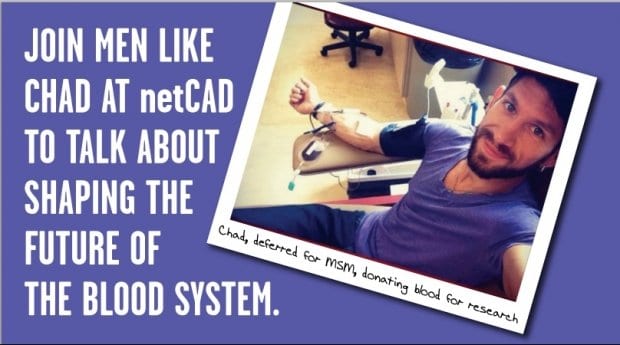Though sexually active gay men are still deferred from giving blood to potential recipients, they are welcome to give blood for research, Canadian Blood Services (CBS) says.
CBS’s research arm, netCAD, is hosting a Rainbow donor clinic and open house, aimed specifically at men who have sex with men (MSM), at its University of British Columbia facility on Feb 4. The blood collected will be used to advance the science of transfusion medicine and transplantation and will never go to a patient.
The Rainbow donor clinic is the initiative of Chad Walters, a gay man who wants to show CBS and Health Canada that men who have sex with men are ready and willing to do what they can to help them achieve their objectives.
“I think that it’s important to do what we can today while waiting for what we may be able to do tomorrow,” says Walters, who has made 12 blood donations to date. “What can I do today? I can donate for research that can potentially impact millions of lives.”
The clinic will offer participants an opportunity to interact with CBS staff and scientists and to win prizes for the YMCA, Score on Davie sports bar, Masc Skincare and Topdrawers apparel.
In July 2013, Health Canada approved a new policy that allows men who refrain from having sex with other men for five years to donate blood. This replaced a lifetime ban on men who have had sex with another man at least once since 1977.
Walters learned about the ban when he tried to donate blood. “When I was 18, I went to the clinic and knew nothing about this policy and was eventually asked to leave because of the policy,” he recalls. “That initiated something. I felt that there was something bigger here. I felt discriminated against because I didn’t understand anything. I view it differently today.”
He subsequently denounced the ban in a newspaper editorial, which caught the attention of CBS officials who invited him to participate in an LGBT focus group in Ottawa.
“I did a lot of research, and through that research I learned a series of things,” he says. “I see why the deferral is important. One of the key points was the scar in Canada’s history. We’re talking about the tainted blood scandal by transfusion HIV and hep C, so of course there was a resistance to making changes because Canada had to really face some challenges.”
The gay blood ban was implemented in the 1980s after the national blood supply was contaminated with hepatitis C and HIV, infecting more than 1,200 people with HIV and more than 25,000 with hepatitis C. The ban was enacted at a time when HIV testing was less reliable, but new tests, such as pooled nucleic acid amplification testing, can now detect the virus seven to 15 days after infection.
CBS, for its part, hopes to expand its dialogue with the communities affected by the gay blood donation deferral, with a vision of possibly changing the policy at some point in the future. “Gay men and MSM are important to netCAD because they are a motivated, healthy group of people who can provide blood to support our research and quality improvement projects, which ultimately benefit all Canadians,” says Tanya Petraszko, CBS’s associate medical director.
“These men can also help by recruiting their friends and families to donate either at netCAD or in Canadian Blood Services clinics. Recruiting from the gay/MSM community will help Canadian Blood Services identify a cohort of donors we could draw from for future research projects related to changing the MSM policy,” she says.
She notes that netCAD is the only clinic of its kind that accepts deferred donors and collects whole units of blood for research purposes.
“Right now, our donor base includes approximately 450 active netCAD donors,” says Patrick Loftus, CBS’s medical services coordinator. “In order to meet demands from our researchers and our Canadian Blood Services production colleagues, we hope to double that number this year. Thus, when Chad came forward with his idea, we fully embraced it, as MSM are one of the donor groups we wanted to engage.”
Loftus also serves as a board member for the Community-Based Research Centre for Gay Men’s Health.
Walters hopes that CBS and Health Canada will eventually reduce the MSM deferral period from five years to six months, which is currently the policy for people who have given birth or gotten a tattoo or a body piercing. South Africa has a deferral period of six months for men who have had sex with men.
“On a personal note, I don’t think that being angry or feeling hurt is doing us any good,” Walters says. “There are ways we can save lives, and one of them was through research and bone marrow. Many MSM don’t realize we can participate in the OneMatch program and donate marrow and white blood cells. We can save lives, but because of anger many can’t see that.”
CBS’s OneMatch Stem Cell and Marrow Network registry matches stem-cell donors with eligible recipients. According to CBS’s website, fewer than 25 percent of patients who require stem-cell transplants are able to find a match within their families. The rest must rely on volunteers.
Canadian Blood Services’ research arm, netCAD, will hold a Rainbow donor clinic on Wed, Feb 4 from noon to 7pm at the University Marketplace at UBC, 207 – 2150 Western Parkway. To book an appointment, call 604-221-5515 or email researchdonations@blood.ca.

 Why you can trust Xtra
Why you can trust Xtra


